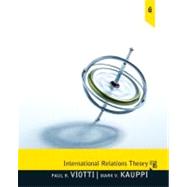
Note: Supplemental materials are not guaranteed with Rental or Used book purchases.
Purchase Benefits
What is included with this book?
Paul R. Viotti is Associate Professor at the University of Denver’s Josef Korbel School of International Studies.
Mark V. Kauppi is Adjunct Associate Professor at Georgetown University’s School of Foreign Service.
*Readings new to the fifth edition.
Chapter 1. Thinking About IR Theory
The IR Field in An Age of Globalization
Epistemology, Methodology, and Ontology
What is Theory?
Images
Interpretive Understandings
Normative Theory
A Look Ahead
Selected Readings
James Rosenau, “Thinking Theory Thoroughly”
*Thomas C. Walker, “The Perils of Paradigm Mentalities: Revisiting Kuhn, Lakatos, and Popper”
PART I. IMAGES OF INTERNATIONAL RELATIONS
Chapter 2. Realism: The State and Balance of Power
Major Actors and Assumptions
Intellectual Precursors and Influences
Power
System
Change
Power Transition
Long Cycles
Globalization and Interdependence
Realists and Their Critics
Selected Readings
Thucydides, “The Melian Dialogue”
Niccolò Machiavelli, “On Princes and the Security of Their States”
Thomas Hobbes, “Of the Natural Condition of Mankind”
Jean-Jacques Rousseau, “The State of War: Confederation as Means to Peace in Europe”
Kenneth N. Waltz, “Explaining War: The Levels of Analysis”
Joseph S. Nye, Jr., “Hard and Soft Power in American Foreign Policy”
Suggestions for Further Reading
Chapter 3. Liberalism: Interdependence and Global Governance
Major Actors and Assumptions
Intellectual Precursors and Influences
Integration
Transnationalism
Interdependence
International Regimes
Neoliberal Institutionalism
Global Governance
Economic Interdependence and Peace
The Democratic Peace
Decision Making
Change and Globalization
Liberals and Their Critics
Selected Readings
Stephen G. Brooks, “Producing Security”
*Robert O. Keohane, “Beyond the Tragedy of the Commons”
Suggestions for Further Reading
Chapter 4. Economic Structuralism: Global Capitalism and Postcolonialism
Major Actors and Assumptions
Intellectual Precursors and Influences
Dependency Theorists
The Capitalist World-System
Change and Globalization
Postcolonialism
Economic Structuralists and Their Critics
Selected Readings
J.A. Hobson, “The Economic Taproot of Imperialism”
*Barbara Bush, “Culture and Imperialism”
Immanuel Wallerstein, “The Modern World System as a Capitalist World Economy”
Suggestions for Further Reading
Chapter 5. The English School: International Society and Grotian Rationalism
Major Actors and Assumptions
Intellectual Precursors and Influences
The Divergence of British and American Scholarship
The Genesis of the English School
Levels of Analysis and Theory
Change
The English School, Liberals, and Social Constructivists
The English School and Its Critics
Selected Readings
Hugo Grotius, “The Law of Nations on War, Peace, and Freedom of the Seas”
Tim Dunne, “Inventing International Society”
Hedley Bull, “Does Order Exist in World Politics?”
Suggestions for Further Reading
PART II. INTERPRETIVE UNDERSTANDINGS
Chapter 6. Constructivist Understandings
Major Actors and Assumptions
Intellectual Precursors and Influences
Intersubjectivity
Structure, Rules, and Norms
Agents
Identity
Logic of Appropriateness
Interests
The Diversity of Social Constructivist Thought
Wendt’s “Naturalist Constructivism”
Constructivist Affinities in the Broader IR Field
Constructivists and Their Critics
Selected Readings
Alexander Wendt, “Constructing International Politics”
Martha Finnemore, “Constructing Norms of Humanitarian Intervention”
Suggestions for Further Reading
Chapter 7. Positivism, Critical Theory, and Postmodern Understandings
Positivism
Intellectual Precursors: Phenomenology and Hermeneutics
Critical Theory: Major Assumptions
Postmodernism: Major Assumptions
Critical Theorists, Postmodernists, and Their Critics
Summation
Selected
Ken Booth, “Critical Explorations and the Highway of Critical Security Theory”
David Campbell, “Writing Security”
Suggestions for Further Reading
Chapter 8. Feminist Understandings in IR Theory
Intellectual Precursors and Influences
Major Assumptions
Strands of Feminism in IR
Gender, War, and Security Studies
Gender and International Organizations
Gendered Understandings and IR Theory
Feminists and Their Critics
Selected Readings
Iris Marion Young, “The Logic of Masculinist Protection: Reflections on the Current Security State”
J. Ann Tickner, “Why Women Can’t Rule the World: International Politics According to Francis Fukuyama”
Suggestions for Further Reading
PART III. NORMATIVE CONSIDERATIONS
Chapter 9. Normative IR Theory: Ethics and Morality
Norms, Ethics, and Morality
Normative Theory: Alternative Perspectives
Justice and War
Justice and Human Rights
Armed Intervention and State Sovereignty
Alternative Images and Foreign Policy Choice
Rationality and Foreign Policy Choice
Values, Choices, and Theor
Selected Readings
Immanuel Kant, “Morality, Politics, and Perpetual Peace”
E.H. Carr, “The Nature of Politics”
*John Rawls, “The Law of Peoples”
*Barack Obama, “On War and Peace” (The Nobel Peace Prize Speech)
Suggestions for Further Reading
The New copy of this book will include any supplemental materials advertised. Please check the title of the book to determine if it should include any access cards, study guides, lab manuals, CDs, etc.
The Used, Rental and eBook copies of this book are not guaranteed to include any supplemental materials. Typically, only the book itself is included. This is true even if the title states it includes any access cards, study guides, lab manuals, CDs, etc.